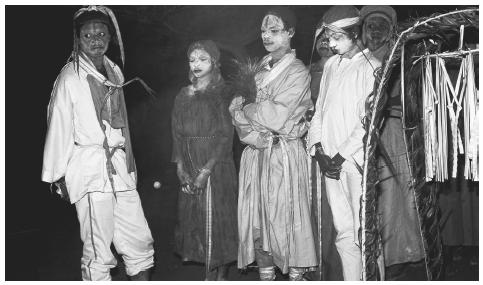Food in Daily Life.
The sharing of cooked food is one of the major ways to cement social relationships and express the high value placed on human company. Sharing food and drink demonstrates hospitality and trust. Social support networks among kin and friends, particularly between country folk and their urban relatives, are held together symbolically with gifts of cooked and uncooked food.

Sacks of beans, maize, or peanuts "from home" can be seen on the roofs of bush taxis traveling between the countryside and urban centers.
Meals consist of a cooked cereal or root staple accompanied by a sauce or stew. In the southern areas, the major staples are root crops such as cassava and cocoyams, and plantains; in the moist savanna and Grassfields, maize and plantains; and in the arid north, sorghum and millet. Rice and pasta have become popular. Staples may be boiled, pounded, or fried; most commonly they are made into a thick porridge shaped into oblong balls. Sauces usually have a base of palm oil and ground peanuts. Vegetables such as greens, okra, and squashes are common. Hot peppers, onions, ginger, and tomatoes are popular condiments. Dried or fresh fish or meat may be included in the sauce. Uncooked fruits such as bananas, mangoes, papayas, oranges, and avocados are popular snacks and desserts; they are not considered part of meals.
In many regions, men and guests eat before women and children. Hand washing is part of the etiquette of meals. Whether from a separate dish or a common pot, a small ball of porridge is formed by three fingers of the right hand and then dipped in sauce. Westernization has led families to eat together around a common table, using separate place settings and cutlery.
Food taboos vary by ethnic group. The Bassa of the Littoral province serve a gourmet dish of viper steaks in black sauce, but only the oldest males among the Ewondo (Beti) of the Center province may eat viper. Totems of specific clans, healers, or royal dynasties are taboo to certain members of some ethnic groups.
Food Customs at Ceremonial Occasions.
At the visit of an honored guest, a wedding, or a funeral, a chicken, goat, sheep, or steer is served to guests. Special drinks, such as palm wine and millet beer as well as bottled carbonated drinks, beer, and wine are served at these occasions. Among the Bamiléké, as part of coronation festivities, the newly installed paramount chief ceremoniously serves each subject a handful of beans mixed with palm oil to symbolize the chief's ability to ensure food and fertility in his realm.
Basic Economy.
The country is basically self-sufficient in food, although the distribution of food is variable. Seasonal famines occur in the arid north. Per capita gross national product (GNP) was $610 in 1996. From 1990 to 1996, the GNP declined and it has shown slight increases since that time. Cameroon has a trade surplus but is burdened by debt. Agriculture, including the production of food and cash crops such as coffee, cocoa, and cotton, employs almost two-thirds of the labor force. Many people produce mainly for themselves, selling the "surplus" at local markets.
Land Tenure and Property.
Among the Fulani, land is inherited patrilineally. In the Grassfields, land is held by fons, with use rights devolving to specific patrilineages and matrilineages. Throughout the country, the privatization of land tenure is increasing. Access to private land titles depends on money, understanding of the bureaucracy, and connections. Women, the main producers of food crops, are often at a disadvantage when land is privatized.
Commercial Activities.
In the towns, there are grocery and dry goods stores. Restaurants and bars, taxis, and domestic labor involve an increasing proportion of the labor force.
Major Industries.
Major industries include mining and aluminum processing, forestry, and the manufacture of beverages. Petroleum is a significant source of national income.
Trade.
Wood, coffee, cocoa, cotton, and palm oil are the principal exports. The trading partners are France, Nigeria, the United States, and Germany. Principle imports include consumption goods; semifinished goods; minerals; industrial and transportation equipment; and food, beverages, and tobacco.
Division of Labor.
The division of labor is determined largely by formal education (for civil servants) and gender. There is some specialization by ethnic group such as herding by Fulani, the butchering and meat trade by Hausa, and transportation by Bamiléké.
